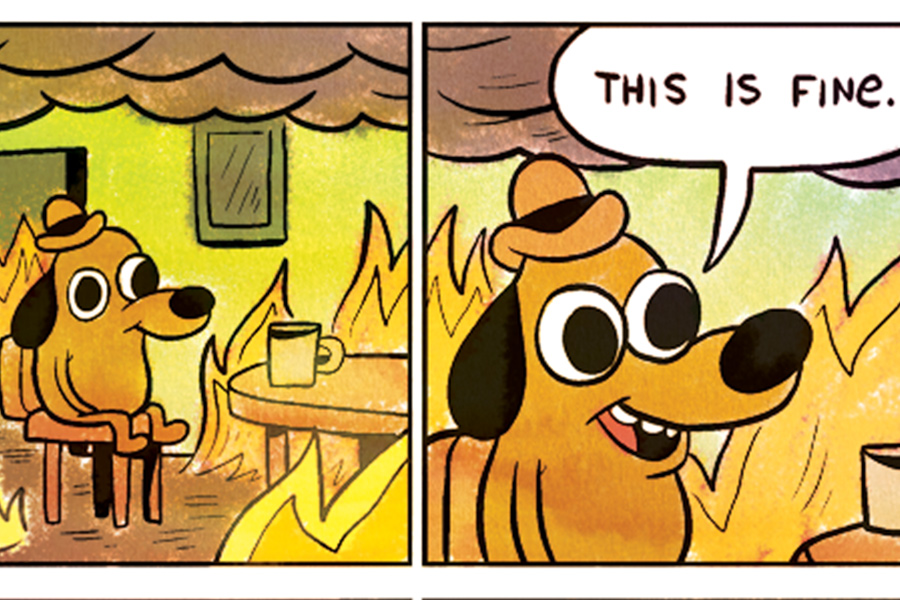
CONTENT WARNING: This article deals with discussions surrounding stress and mental health. If you are struggling at the moment, please call Lifeline on 13 11 14, headspace on 1800 650 890, or the Suicide Call Back Service on 1300 659 467. If you are in immediate danger, call 000.
Welcome friend, let me take you back to a certain moment in time – that time being the first few weeks of January.
I felt stressed about my career – I’d been freelancing for years and hadn’t been able to secure a full-time job. I missed my family, having moved to Sydney from Melbourne last year. Then there were difficulties with where I was living. I was also wanting the attention of a boy who, in hindsight, was completely undeserving of my time.

Long story short, whether it be professional or personal, I felt unappreciated and a tad alone.
Through all of this, however, I’d literally been saying that everything was fine – “It’s fine, everything’s fine, we will rebuild!” – when, in fact, things weren’t fine. I wasn’t okay in the slightest. I was stressed as hell.

This all came to a head a couple weeks down the track when, after a particularly boozy night, I woke up in the morning feeling unable to breathe. I lost feeling in my hands and feet. With my roommate now by my side, I had an hour-long panic attack.
The world seemed like it had just crumbled around me. This whole “I’m fine, everything’s fine” facade had also crumbled around me.
I was lucky to have my roommate with me, and my Mum on the phone throughout the whole thing, because after I’d expressed my frustrations and my sadness to them, I felt like I could breathe a little easier.
In hindsight, there were times when I should have vented my stresses earlier – and if I had done so I don’t think things would have escalated the way they did – but I was just preoccupied with seeming fine, and cautious of seeming like ‘too much’, like a wet blanket to those around me.

Now, I’m all for a positive outlook – I believe that it’s detrimental to constantly be pessimistic – but I also think that there’s this constant need for everyone to seem fine when they’re not.
And in actuality, it’s okay to not be fine.
Everyone has stresses and moments when they feel like they’re drowning. Everyone also deserves to feel safe and secure enough to vent.
With this in mind, there are many outlets to turn to if you also feel like life’s getting a little too stressful. In these ‘drowning’ moments, it’s important to be a little selfish – take the time to focus on your mental wellbeing by doing things that make you happy. Take a step back to reassess things.
My old therapist used to say, “you should be doing at least one activity each day that makes you feel productive, and at least one activity each day that genuinely gives you joy.” Be it listening to your favourite tunes, writing, running, playing tennis, calling your mum – do that thing everyday. Even the smallest thing, like cleaning your room or buying yourself a new tee, can make a difference. You deserve to treat yourself.
Another favourite stress-relieving task of mine is to write lists. When I’m feeling sad or stressed, I write a list of all the things that are contributing to my stresses. I then break these dot points down into small and achievable goals. It may seem a bit pedantic, but it’s surprisingly therapeutic.
Either way, if you and I don’t talk about what’s making us upset, or make practical decisions to change our state of mind, we harbour resentment that sits there, ruminating. This resentment, aimed at ourselves, others and the world, will continue to build up until, like a balloon that’s being filled with too much water, it needs to be released.
Accepting that you aren’t fine is the first step to figuring out why you aren’t fine, ultimately providing you with insight into what you need to do to in order to be fine.
And this is why we need to stop pretending to be fine.
P.S. Whether it’s a family member, a friend or support services such as headspace or Lifeline, there’ll always be someone who wants to help you through stressful situations. You’re never an inconvenience.
P.P.S. “A problem shared is a problem halved,” my Dad always tells me. The older I get, the more I agree.

Want to learn more about mental health and wellbeing, or have access to help lines, counselling and support groups? Check out QLD Health‘s mental health and wellbeing site. They have your back (and your mind).
If this article has affected you in any way, or you would like to talk to someone, please call headspace on 1800 650 890, Lifeline on 13 11 14 or the Suicide Call Back Service on 1300 659 467. If you are in immediate danger, call 000.
Lead image: © kc green, kcgreendotcom.com



